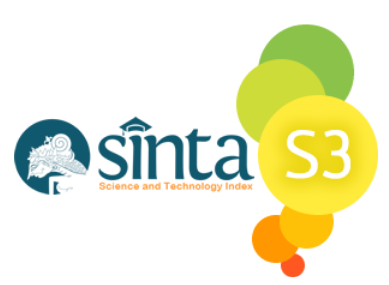PERSONAL CHARACTER DEVELOPMENT OF ACCOUNTING STUDENTS THROUGH CASE-BASED METHOD DURING THE COVID-19 PANDEMIC
Abstract
Primary Objective - to analyze the actions and experiences of accounting lecturers and students in online learning during the Covid-19 pandemic.
Method - The study was action research. Data were collected through observation, discussion, documentation, and interviews. Research participants consisted of lecturers and students. Data analysis employed an interactive model.
Primary Findings - Lecturers should be more creative and innovative in managing online classes. The personal characters developed include high participation, tolerance, respect for differences, independence, and thinking fast and critically.
Theory and Policy Implications – This research contributes to the development of accounting education. Universities and faculties can make the case-based method an alternative for technical accounting courses.
The research novelty is implementing the case-based method in online accounting education.
Keywords
Full Text:
PDFReferences
Apostolou, B., Dorminey, J. W., Hassel, J. M., & Rebele, J. M. (2017). Analysis of trends in the accounting education literature (1997–2016). Journal of Accounting Education, 41, 1–14. https://doi.org/10.1016/j.jaccedu.2017.09.003
Auzair, S.M, Aman A & Maelah R. (2014). Learning accounting through case study method, teaching and learning in law and economics, a way forward. Chapter 6. Pusat Pengajaran dan Teknologi Pembelajaran. Universiti Kebangsaan Malaysia. Bangi. Malaysia
Baldauf, J., Graschitz S. & Müller C. (2020). A teaching concept for auditing – evaluation of the ILPA case. Accounting Education, 29:4, 372-408, DOI: 10.1080/09639284.2020.1768568
Behn. B., W.F. Ezzel, L.A. Murphy, J.D. Ray-Burn, M. T. Snith, & J.R. Strawser. (2012). The Pathways Commission on accounting higher education: charting a national strategy for the next generation of accountants. Issues in Accounting Education, 27(3), 595-600.
Black, W. H. (2012). The activities of the pathways commission and the historical context of changes in accounting education. Issues in Accounting Education, 27 (3), 601-625.
Bungin, H. M. B. (2011). Penelitian Kualitatif: Komunikasi, Ekonomi, Kebijakan Publik dan Ilmu Sosial Lainnya. Jakarta: Kencana Prenada Media Group.
Creswell, J. W. (2012). Research Design: Pendekatan Kualitatif, Kuantitatif dan Mixed (a. Fawaid, Trans.). Yogyakarta: Pustaka Pelajar.
Dewantara, K.H. (1952). Trisakti Jiwa. Mingguan Nasional, 9 Februari, Tahun III, Nomor 6.
Effah, N. A. A. & Nkwantabisa, A. O. (2021). The influence of academic engagement on academic performance of university accounting students in Ghana. South African Journal of Accounting Research, DOI: 10.1080/10291954.2021.1988204
Ekasari, K., Eltivia, N., Wahyuni, H., & Soedarso, E.H. (2016). Akuntansi bertrisakti jiwa: menciptakan akuntan yang berkompeten dan berdaya saing di era MEA. Jurnal Akuntansi Multiparadigma, 7(3), 453-467. DOI: http://dx.doi.org/10.18202/jamal.2016.12.7032
Fijri, I. D. M. (2018). Development of educational comic “accounting days” as accounting learning media to improve students’ learning motivation. Jurnal Pendidikan Akuntansi Indonesia, XVI(2)
Helliar, C. (2013). The global challenge for accounting education. accounting education, 22(6), 510-521, DOI: 10.1080/09639284.2013.847319
Iskandar & Maeshalina, D. (2020). Efektivitas penggunaan metode discovery learning, inquiry, dan problem based learning dalam meningkatkan kemampuan berpikir kritis, Jurnal Pendidikan Akuntansi dan Keuangan, 8(1), 55-68
Lestari, N & Sukanti. (2017). Implementasi model tgt untuk meningkatkan aktivitas belajar dan hasil belajar akuntansi, Jurnal Pendidikan Akuntansi Indonesia, XV, (1)
Kamayanti, A. (2016). Metodologi Penelitian Kualitatif Akuntansi: Pengantar Religiositas Keilmuan. Jakarta: Yayasan rumah peneleh.
Knyviene I. (2014). A new approach: the case study method in accounting, Economics and Management Journal, 4, DOI: 10.12846/j.em.2014.04.12
Miles, M. B., & Huberman, A. M. (1992). Analisis Data Kualitatif (T. R. Rohidi, Trans.). Jakarta: UI Press.
Opdecam, E. & Everaert, P. (2019). Choice-based learning: lecture-based or team learning? Accounting Education, DOI: 10.1080/09639284.2019.1570857
Rahayu, S., Yudi & Sari, D.P. (2016). Makna “lain” biaya pada ritual ngaturang canang masyarakat Bali. Jurnal Akuntansi Multiparadigma, 7(3), 382-398, DOI: http://dx.doi.org/10.18202/jamal.2016.12.7028
Rusdi, M. (2020). Penelitian Perlakuan Kependidikan (Educational Treatment-Based Research): Perpaduan Penelitain Desain, Penelitian Tindakan, dan Penelitian Eksperimen dalam Permaslaahan Kependidikan. RajaGrafindo Persada.
Sanster, A, Stoner G & Flood B. (2020). Insights into accounting education in a Covid-19 world. Accounting Education, 29 (5), 431-562, https://doi.org/10.1080/09639284.2020.1808487
Tsiligiris, V & Bowyer D. (2021). Exploring the Impact of 4IR on skills and personal qualities for future accountants: a proposed conceptual framework for university accounting education. Accounting Education, May, https://doi.org/10.1080/09639284.2021.1938616
Tuanakotta T.M. (2014). Audit berbasis ISA: International Standards on Au.diting, Salemba Empat, Jakarta
Utari D.W & Mustikawati R I. (2017). Implementation of problem based learning model to improve creative thinking ability. Jurnal Pendidikan Akuntansi Indonesia, XV(1)
Wakil G. (2008), Methods and Strategies for Approaching Cases in Managerial Accounting, http://ssm.com./abstract=747796.
DOI: https://doi.org/10.18551/erudio.9-1.8
Refbacks
- There are currently no refbacks.
Copyright (c) 2022 Erudio Journal of Educational Innovation

This work is licensed under a Creative Commons Attribution 4.0 International License.












